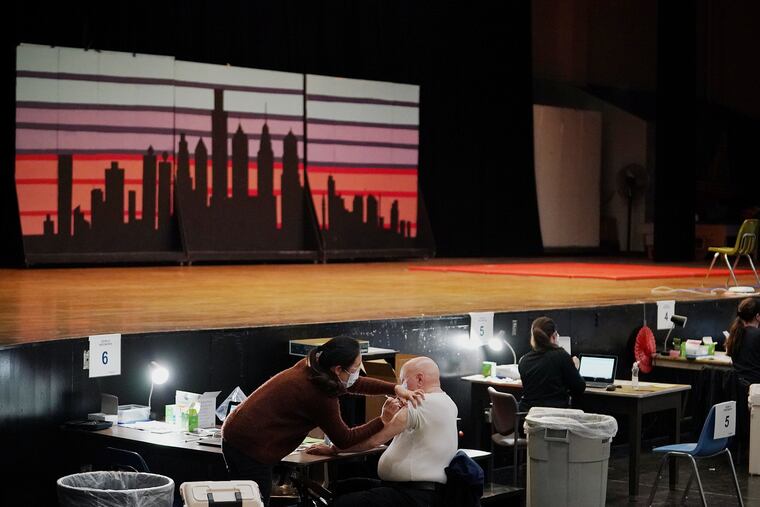9,000 Philly teachers have been vaccinated and thousands more are eligible as some schools prepare to open Monday
“We’re particularly focused on doing all that we can to promote the safe reopening of schools across Philadelphia,” CHOP’s medical director said.

Every educator who works in Philadelphia and wants the COVID-19 vaccine can be inoculated by the end of the month, officials said Thursday.
Through a partnership of Children’s Hospital of Philadelphia, the city, and the Philadelphia School District, about 9,000 teachers and other school staff have received their first doses of the Pfizer vaccine, and in all, 20,000 district, charter, parochial, and independent school teachers, as well as day-care workers, have appointments for shots.
Altogether, about 35,000 are eligible to receive vaccines at one of six sites around the city — including CHOP’s Roberts Center for Pediatric Research and South Philadelphia High School, where officials gathered in the gym Thursday for a news conference as hundreds of school staff were being vaccinated in the school auditorium.
Inoculating teachers and staffers has been one of the most debated and critical steps in the path to reopening. Open schools not only serve as community hubs but can help pave the way for parents to return to a pre-pandemic work schedule.
The partnership with CHOP, supported in part by a $250,000 grant from the Independence Blue Cross Foundation, is a cutting-edge one nationally, according to Superintendent William R. Hite Jr. He said superintendents from other states told him in a call Wednesday that they are just now vaccinating their teachers over age 65.
“We’re particularly focused on doing all that we can to promote the safe reopening of schools across Philadelphia,” Ron Keren, CHOP’s medical director, said at the news conference. “The research clearly shows that students, particularly students from lower-income communities and disadvantaged backgrounds, do best when they’re in classrooms.”
Philadelphia Health Commissioner Thomas Farley has also urged returning children, particularly elementary-age students, to classrooms with safety precautions in place.
“I’m a pediatrician, I care a lot about children, and it’s been very sad for me to pass empty school buildings,” Farley said. “I’ve long thought that we need to have our kids back in school so they can learn, and set them up for a good future. It’s wonderful to be back in a school today.”
Teachers at 53 Philadelphia schools returned to buildings Wednesday in advance of about 2,650 prekindergarten through second-grade students reporting Monday — the first children to be taught in classrooms in a year. The goal is to bring children in those grades back to all 152 elementary schools by March 22, Hite said.
» READ MORE: Philadelphia needs ‘sanctuary schools,’ immigrant rights group demands
The return comes after a tense month, with the Philadelphia Federation of Teachers blocking a return over concerns about building safety. The mayor, national teachers’ union president Randi Weingarten, and a third-party mediator got involved after PFT president Jerry Jordan directed his members not to report to buildings and Hite threatened disciplinary action against teachers.
Hite at Thursday’s news conference said he believed teachers’ return had gone smoothly, and said the Monday reopening was still on track.
The next round of 50 or so elementary schools to reopen will be announced Monday, Hite said, with the goal of getting all 9,000 prekindergarten through second graders whose families chose in-person learning back in schools by March 22. After that, children in those grades whose families had opted at first for fully virtual learning will have the ability to return.
Even then, most of the district’s 120,000 students will continue with remote learning, as they have since March 15, 2020. Hite said he wants children in all grades back by the end of the school year.
The superintendent said he had heard no reports of educators refusing to enter buildings and said “knock on wood, we haven’t heard much” from returning school staff about problematic building conditions. District officials said they wanted teachers back early to prepare for their students but also to flag any building issues that needed to be resolved.
“We understand from principals yesterday that there was a lot of excitement,” Hite said.
Arthur Steinberg, the president of the American Federation of Teachers Pennsylvania and PFT’s health and welfare fund director, said he’s heard excitement but also seen firsthand and received reports of some issues, as he said was not unexpected in a large district. “We’re in the process of compiling reports on them, and we’ll submit them to the district,” he said.
In many cases, schools that have been closed for a year have not been properly deep-cleaned, as promised by the school system.
But at Mayor Jim Kenney’s insistence, communication between the two sides is much improved, Steinberg said. “There are still challenges with this, but we are talking every day,” said Steinberg.
He predicts children in the initial 53 schools will be back on Monday but said it’s not a lock that the next group of schools will be announced the same day. “There was never any agreement to do 50 by Monday,” said Steinberg. “We hope to get as many done as we can. It really is all dependent on all data we receive from the district.”
Some teachers took to social media and other outlets to report subpar conditions inside their schools.
Samantha Rutherford, a kindergarten teacher at Bethune Elementary in North Philadelphia, posted photos on Twitter and wrote: “dirty toilets! Mouse poop everywhere! No sanitizing stations by doors!”
Kate Sannicks-Lerner, who teaches kindergarten at DeBurgos Elementary, also in North Philadelphia, said she found mold, debris, and dirt in rooms scheduled to be occupied.
The school system has engendered a long history of distrust over conditions inside its 220 school buildings, with conditions ranging from lead paint and asbestos to an inability to keep schools supplied with basics like hot water and soap. Officials have pledged to provide these things consistently going forward.